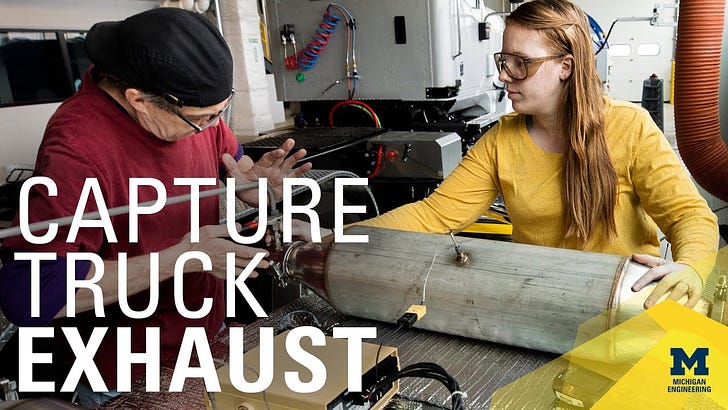It’s no secret that transportation is a major contributor of GHGs. Of the 6.6 billion metric tons of CO2e emissions generated each year in the U.S., nearly a third comes from transportation and, within that segment, 23% comes from medium and heavy-duty trucks. That amounts to approximately 450 million metric tons of GHGs (6.8% of the total U.S. emissions) produced annually from an estimated 2 million semi-trucks crisscrossing the country!
While the advancement and adoption of lithium-ion batteries, EVs, charging infrastructure, and hydrogen-powered technologies hold the promise of cleaner transportation, the nature of trucking requires custom solutions in order to reduce its carbon footprint. There are several reasons for this. Current lithium-ion batteries produce 35x less energy than gasoline. Further, the range an EV truck would require to compete with legacy trucks on delivery speed and capacity (>600 miles in many cases) necessitates a charging infrastructure that may take many years to construct. Bill Gates notably summed up the problem:
“Even with big battery breakthroughs, electric vehicles will probably never be a practical solution for things like 18-wheelers.”
Hydrogen fuel faces similar hurdles. Highly flammable, hydrogen would require reinforcement on trucks that would reduce the payload capacity because of the additional material involved. Moreover, the lack of hydrogen refueling infrastructure and the cost of the fuel itself is currently prohibitive to adoption. While these challenges may resolve themselves over the long term, the urgency of climate change and strong corporate interest requires an immediate solution.
For this reason, we’re excited to announce our investment in Remora as it deploys its carbon capture technology to the millions of semi-trucks across the globe and builds a business storing and selling captured CO2. We’re proud to back Paul, Christina, and Eric, who make up the Remora team, as well as join Y Combinator, Lowercarbon Capital, Union Square Ventures, First Round, and a roster of other investors who have thrown their support behind the company’s vision.
What is Remora?
Remora was co-founded by Paul Gross (CEO), Eric Harding (Chief Engineer), and Christina Reynolds (CTO) and is based upon Reynolds’s doctoral research into mobile carbon capture. At the company’s Detroit, MI facility, the team has been retrofitting semi-trucks with their proprietary carbon capture technology. The hardware is installed between the truck and its trailer, where it attaches to the tailpipes of the vehicle and captures its carbon emissions.
Remora mounts between a truck and its trailer, attaching to its tailpipes and capturing ~80% of its carbon emissions.
Remora plans to establish CO2 offloading sites at distribution centers and truck stops, where captured emissions are pumped and stored in tanks. From there, Remora picks up the CO2 in a tanker truck and permanently stores the CO2 underground, which it can then monetize through tax credits and the sale of carbon offsets. In the short term, Remora plans to sell CO2 to concrete producers and other businesses that use it as input.
Remora’s envisioned business follows similar carbon capture and storage models.
You can listen to a conversation between Jason and Remora’s CEO, Paul, on MCJ’s Startup Series here.
Why Did We Invest?
Founder Fit
Christina, Paul, and Eric are a powerhouse team bringing together research experience, engineering talent, and an entrepreneurial spirit. Christina is a former EPA scientist who pioneered mobile carbon capture during her engineering Ph.D. at the University of Michigan, work which has been critical to laying the technological groundwork for Remora’s business. Paul’s background in experimental research and his founding of the Yale Politics Initiative highlight his entrepreneurial acumen, which has been instrumental in generating interest from prospective customers and securing the backing of key investors. Rounding out the team’s expertise, Eric brings a decade of experience as a diesel truck mechanic and an engineer in the automotive industry to solve tactical challenges and bring products to market.
Tackling a Hard to Decarbonize Sector
For the aforementioned reasons, trucking is a challenging sector to decarbonize. With its technology, Remora expects to capture up to 169 metric tons of CO2 annually from an average semi-truck with its technology. Targeting 2 million trucks using the technology which represents 338 million metric tons abated per year in the U.S. alone through Remora’s system. Remora also sees diverse applications of its technology to similarly hard-to-decarbonize industries like mining trucks, cargo ships, and other long-haul, heavy-duty transportation that is difficult to electrify.
Strong Customer Interest
In the year since its founding, Remora has achieved impressive traction from major corporations, spanning a variety of industries, that share a keen interest in decarbonizing their logistics footprints. We believe this signals a ripe and captive market with few options currently available to make a meaningful dent into this heavily emitting aspect of their operations. We are confident that Remora can capitalize on this early customer engagement and create a durable advantage with both its carbon capture technology and its offloading and retrieval network. The impressive capabilities of the team, coupled with the initial market response, drive our belief that Remora can radically curb trucking’s climate impact.
Additional Reading
The Wall Street Journal (paywall): “Heavy-Duty Truck Operators to Test Startup’s Onboard Carbon-Capture System”
Fast Company: “This new device captures CO2 from trucks as they drive”
If you are an accredited investor and want to learn more about being an investor in our fund (to back more great companies like this one!), reach out here.





